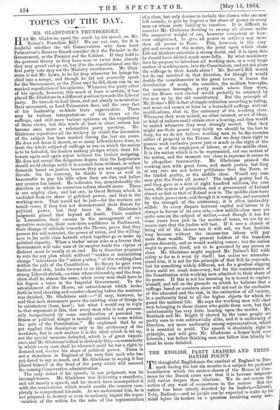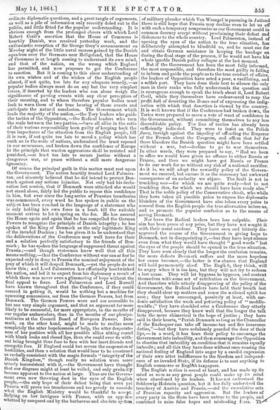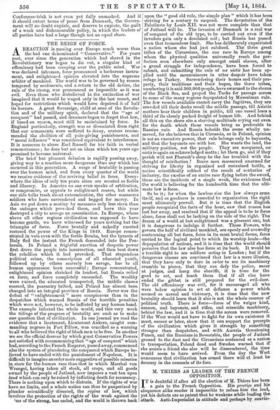THE ENGLISH PARTY LEADERS AND THEIR DANISH POLICY.
TO thoughtful Englishmen the conduct of England to Den- mark during the last six months is a subject for profound humiliation which the useless cheers of the House of Com- mons for the Danish cause now that it is become desperate will rather deepen than alleviate. We do not accuse the nation of any want of earnestness in the matter. But the nation has been utterly deserted by its leaders,—Liberal, Tory, Radical,—and no people can be expected to make up its mind before its leaders on a question involving many sub- ordinate diplomatic questions, and a great tangle of arguments, as well as a pile of information only recently doled out to the public, and little fitted for the popular understanding. It is obvious enough from the prolonged cheers with which Lord Robert Cecil's assertion that the House of Commons is heartily Danish, was received yesterday week, and the enthusiastic reception of Sir George Grey's announcement on Monday night of the little naval success gained by the Danish squadron over the' Germans near Heligoland, that the House of Commons is at length coming to understand its own mind, and that of the nation, on the wrong which England las permitted, and now proposes to get the Conference to sanction. But it is coming to this clear understanding of its own wishes and of the wishes of the English people almost, if not quite, too late for any adequate remedy,—as popular bodies always must do on any but the very simplest issues, if deserted by the leaders who can alone weigh the -significance of passing events with any clear perception of their meaning, and to whom therefore popular bodies must look to warn them of the true bearing of those events and anticipate the natural conclusion. The Government which leads the majority of the nation,—the Tory leaders who guide the tactics of the Opposition,—the Radical leaders who turn the scale between the two parties,—have all alike in the ratio -of their various responsibility been guilty of keeping back the true importance of the situation from the English people, till it is now, if not quite too late to mend a policy which has sunk us in the scale of nations, undermined the trust reposed in our assurances, and broken down the confidence of Europe in the principle that wanton aggressions shall be resisted and punished,—at least too late to secure justice without a slangerousi war, or peace without a still more dangerous ignominy.
Of course the principal guilt in this matter must rest upon the Government. The nation heartily trusted Lord Palmers- ton, and sincerely believed that he did intend to protect Den- mark against any sei-ious injustice. Not only had his decla- ration last session, that if Denmark were attacked she would not stand alone, fairly led the public to repose this confidence in him, but ever since the long series of Prussian treacheries was commenced, every word he has spoken in public on the subject has been couched in the language of a statesman who is only holding his own force in a leash till the suitable 'moment arrives to let it spring on the foe. He has assured the House again and again that he has compelled the German Powers to recognize the principle of Danish integrity ; he has ePoken of the King of Denmark as the only legitimate King of the invaded Duchies ; he has given it to be understood that the deliberations of the Conference may well have for their end a solution perfectly satisfactory to the friends of Den- mark; he has spoken the language of suppressed threat against Prussia ;—and though statesmen know well that all this means nothing,—that the Conference without war can at best be expected only to deny to Prussia the nominal enjoyment of the prey of which it will despoil Denmark,—yet the people do not know this ; and Lord Palmerston has effectually hoodwinked the nation, and led it to expect from his diplomacy a result of which there was never even a glimmering of hope without the final appeal to force. Lord Palmerston and Lord Russell have known throughout that the Conference, if they could succeed in getting it, would be nothing but a machine for squeezing concessions, not from the German Powers, but from Denmark. The German Powers ;were and are accessible to but one very simple argument, and that an argument far more likely to be successful, far more appropriate, in the mouths of -our regular ambassadors, than in the mouths of our plenipo- tentiaries at the Council Board of European Powers. Den- mark, on the other hand, might be made to realize more 'completely the utter hopelessness of help, the utter desperate- ness of her position with all her possible allies sitting round with blank looks and closed lips, than she could ever do with- out being brought thus face to face with her inert friends and -energetic foes. If England could but secure the suspension of hostilities, and then a solution that would bear to be construed as verbally consistent with the magic formula " integrityof the Danish Kingdom," though really no solution were more utterly inconsistent with it,—the Government have thought that our disgrace might at least be veiled, and only graduilly become apparent to the nation at large. Thus are the Govern- ment even now throwing dust in the eyes of the English people,—the only hope of their defeat being that even yet Prussia will prove too treacherous and too greedy to concede what the English Ministry would be thankful to nce(pt. Relying on her intrigues with France, with an appaite whetted by conquest and by the barbarous and obsolete system of military plunder which Von Wrangel is pursuing in Jutland there is still hope that Prussia may decline even to let- us off with such a temporary compromise as our Government could in common decency accept without proclaiming their defeat end dishonour to the whole country. Lord Palmerston, instead of opening the eyes of the nation to the true situation, has deliberately attempted to blindfold us, and he must sue for and obtain German assistance in keeping the bandage on during the final stage of the process, if he would not have his whole ignoble Danish policy collapse at the last moment.
But if the Government has been the most fully informed, the most responsible, and therefore the most guilty in failing to inform and guide the people as to the true conduct of affairs, the leaders of Opposition have acted a poor, a vacillating, and a selfish part. They have done their best to silence the only man in their ranks who fully understands the question and is courageous enough to speak the truth about it, Lord Robert Cecil, while they themselves have endeavoured to reap the profit both of deserting the Danes and of expressing the indig- nation with which that desertion is viewed by the country. It is well known that if the Conference had broken down, the Tories were prepared to move a vote of want of confidence in the Government, without committing themselves to any less discreditable policy. The line of tactics has already been sufficiently indicated. They were to insist on the Polish fiasco, inveigh against the impolicy of offending the Emperor of the French about the Congress, and affirm that but for those blunders the Danish question might have been settled without a war, but—decline to go to war themselves. In other words, they were prepared to say, "lied we been in office we would have given no offence to either Russia or France, and then we might have got Russia or France to do our work for us without any risk of a national sacrifice. As it is, we will adopt the cowardly policy of the Govern- ment we succeed, but excuse it as the necessary but awkward consequence of an audacity we abjure. The fault is not in truckling now—for which we are quite ready—but in not truckling then, for which we should have been ready also." That is the noble policy of the Conservative chiefs, who while they have taken all possible pains to expose the diplomatic blunders of the Government have also taken every pains to conceal from the English people the true alternative before us, and to promote the popular confusion as to the means of saving Denmark.
Nor have the Radical leaders been less culpable. Their aim has been peace at any price, but they have not sought it with their usual candour. They have seen and bitterly dis- approved the course of the Government in giving hope to Denmark, not in disappointing it,—but they have kept silence even from what they would have thought "good words" lest the eyes of the people should be opened to the true situation. They have seen clearly that the longer the confusion remains, the more defeuts Denmark suffers and the more hopeless her cause becomes,—the better is the chance that England will hold permanently aloof. The Engli.h, they think, will be angry when it is too late, but they will not try to redeem a lost cause. They will let bygones be bygones, and content themselves with some act of retribution on the Government. And therefore while utterly disapproving of the policy of the Government, the Radical leaders have held their breath lest they should clear up matters and rouse the national spirit too soon ; they have encouraged, passively at least, with, sar- donic satisfaction the weak and pottering policy of " meddle- muddle ;" they have chuckled over a Conference they utterly disapproved, because they know well that the longer the talk lasts the more chimerical is the hope of justice ; they have said in their hearts, "Perish Denmark so long as the Chancellor of the Exchequer can take off income-tax and fire insurance duties,"—but they have sedulously guarded the door of their lips,— in a word, it has been their policy to encourage the Government into imbecility, and then encourage the Opposition to chastise that imbecility on condition that it remains equally imbecile; and all this they have done without once rousing the national feeling of England into anger by a candid expression of their own utter indifference to the freedom and independ- ence of an invaded State, if its defence is to cost anything to English commerce or Englikh taxpayers. The English nation is sound at heart, and has made up its mind as soon as any great people could make up its mind when abandoned by its leaders. It has not understood the Schleswig-Holstein question, but it has fully understood the treachery of Austria and Prussia,—and the cumulative acts of Prussian rapacity and aggression. But the leaders of combined to raise false hopes and misleading Lars. TV every party in the State have been untrue to . the people, and
































 Previous page
Previous page